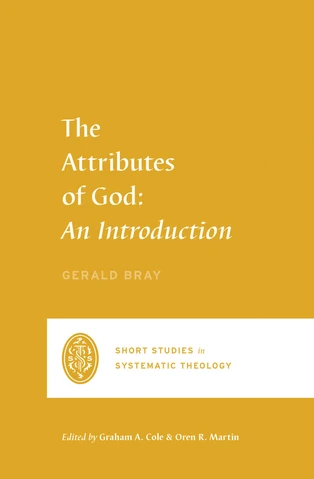
Gerald Bray
Reviewed by: Ryan M. McGraw
The Attributes of God: An Introduction, Short Studies in Systematic Theology, by Gerald Bray. Crossway, 2021. Paperback, 160 pages, $15.19 (Amazon). Reviewed by OP professor Ryan M. McGraw.
God’s attributes are vital for Christian faith and practice. Christianity is ultimately about knowing the right God in the right way. The right God is triune, and he reveals himself through his attributes and acts. The right way to know him is through Spirt-worked faith in his Son, Jesus Christ. Gerald Bray provides readers with a clear and easy-to-follow guide into the unsearchable depths of God. Following the precedent set by John of Damascus (675–749), who was the first theologian to classify the divine attributes, Bray directs readers through a biblical pathway that promotes knowing God, walking with him, and marveling at him, and that will benefit believers of every level.
While the topic of the divine attributes is complex, Bray’s plan is simple. In four chapters, he treats God’s being and attributes, God’s essential attributes, God’s relational attributes, and the practical significance of his attributes for believers. He covers a wide range of attributes, recognizing that attributes describe the one and simple being of God without defining him decisively. He summarizes his approach well by stating,
The theology of God’s attributes is therefore both a confident expression of faith and a humble admission of ignorance in line with the nature and content of God’s self-disclosure to us. (19)
His treatment is consistently Trinitarian, in which he locates God’s intra-personal relations in the Godhead and his personal relationship with redeemed people. Personality, as such, is not a divine attribute, but connects us to the attributes personally via the Trinity. Christology looms large in these pages as well, illustrating how Christ declares the invisible God to us, without confusing Jesus’s human and divine natures. The appendix is particularly valuable, since it sketches ways in which theologians have classified and listed God’s attributes from the early church, through the Middle Ages and the Reformation, and up to the present. This material is particularly valuable because there are almost no two lists of divine attributes that agree fully. Bray shows readers that even though this is the case, there is often a tacit set of reasons undergirding various lists of attributes.
Bray devotes a large amount of space to the issue of divine impassibility, since this is a recent area of theological contention (34–45). Sympathetic to his critics and well-balanced, this section illustrates why God is not distant and aloof from human suffering, while defending God’s inability to suffer. Christ suffered according to his human nature, and in this way, “God suffered and died in the only way he could” (36–37), namely, by God the Son taking on a passible human nature. His explanation of the doctrine is filled with Scripture texts that assume, imply, and illustrate divine impassibility, bolstered by theological arguments. With regard to the related and equally debated issue of divine simplicity, Bray illustrates particularly well how the divine attributes imply one another and interrelate (e.g., 70). He is sensitive to modern debates related to the doctrine of God, without letting them derail his edifying biblical narrative as a whole.
This book is an excellent primer on the divine attributes that sets the right tone for studying the subject.
November 09, 2025
November 02, 2025
October 26, 2025
October 19, 2025
October 05, 2025
Raising Sexually Faithful Kids and
Parenting Boys and Girls in a Gender-Confused World
September 28, 2025
Calvin’s Ecclesiology: A Study in the History of Doctrine
September 21, 2025
© 2025 The Orthodox Presbyterian Church